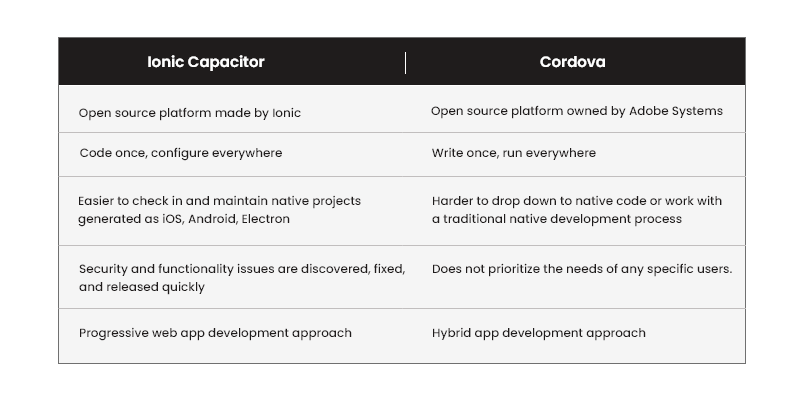With the advent of Capacitor Js in 2019, Ionic undoubtedly became one of the preferred cross-platform and progressive web app (PWAs) development choices.
Before 2019, the two dominating players known to shell Ionic apps successfully were Phonegap & Cordova.
But with the ever-evolving iOS and Android ecosystems and hardware updates, Cordova began facing challenges when coping with the changes; and to stay on top of the competition, Ionic had to advance itself and develop a robust solution that helped them ensure seamless working with advanced OS and hardware features.
That’s when Ionic came up with Capacitor. A version-independent cross-platform runtime for building dynamic web apps that can access native device features and seamlessly work on iOS, Android, and the web.
Considering the accelerated growth and prominence of Ionic’s Capacitor, in this blog, we decided to dig deeper into the essence of the contemporary cross-platform app development approach and how it differs from other app development frameworks.
Ready to unveil? Let’s Begin!
An Introduction to Ionic Capacitor
Ionic’s Capacitor is an open-source, cross-platform runtime for building dynamic web apps with an intuitive yet easy-to-use interface for obtaining Native SDKs & APIs on each platform.
Being an advent of Ionic, Capacitor delivers runtimes similar to React Native and Cordova but with a modern, web-first approach leveraging web APIs, native tools, and other modern dev standards. In essence, cross-platform app developers prefer writing their app code in HTML, CSS, and JavaScript and then leveraging Capacitor to bundle or package it with native capabilities and deliver it to the right platform.
Also, Read – Native, Hybrid, OR PWAS – Which Is The Best Mobile App Development Approach?
Why are Developers Choosing Ionic Capacitor?
When developing a cross-platform mobile app, developers have numerous app development frameworks to choose from. Right from Flutter and Xamarin to React Native & Ionic Capacitor.
Let’s unveil what differentiates Ionic Capacitor from other app development frameworks.
Modern Approach to Cross-Platform App Development
With modern native tooling and web platform features, Ionic Capacitor proffers a more streamlined and contemporary approach to developing cross-platform apps for iOS, Android, and the web. Here’s how:
Version Managed CLI Tooling
One key functionality that differentiates Ionic Capacitor from other cross-platform app development frameworks is the provision of local CLI instead of global CLIs.
Primarily Command Line Interface (Ionic CLI) is a tool that equips Ionic developers with numerous useful commands and quickly scaffolds Ionic apps, thus easing the applications’ installation and updating. Now, while developing cross-platform apps with Capacitor, a small CLI tool is installed locally into each project as an npm script, making it simple by eliminating global dependencies and employing multiple Capacitor versions in every application you create.
Command over Native Device Features
When developing cross-platform apps, Ionic Capacitor developers have complete access to each platform’s full Native SDK, enabling them to quickly deploy their apps to App Stores and the web.
Moreover, adding native functionality to the cross-platform app is easy with a single Plugin API that works flawlessly for JavaScript for the web Swift on iOS and Java on Android.
Put, cross-platform app developers can quickly develop one single app by targeting a set of APIs irrespective of the platform the app is intended to run using Capacitor and escape the hustle of operating with platform-specific multiple APIs.
Platform Flexibility
Ionic Capacitor is considered a robust successor to Cordova because of its unparalleled system flexibility. Primarily when developers build web apps and wrap them in native containers, there are numerous platform-level challenges they have to face.
However, Ionic Capacitor effectively caters to the system-specific challenges and offers:
Progressive Web App (PWA) Support
Compared to other cross-platform app development frameworks, Ionic Capacitor is the only native runtime capable of delivering the best-in-class native UI experience from PWAs.
In addition, empowering developers to build plugins that include web functionality is another advantage of using Ionic Capacitor for developing cross-platform apps.
Simply put, Capacitor proffers a robust plugin system that eases having native functionality in the app, thus enabling users to benefit from this system to add intuitive web-based features per their requirements.
Also, Read – Progressive Web Apps – What are they & How can they Impact your Business?
Efficient Native and Web Collaboration
The Capacitor is a native cross-platform runtime. However, since the key design consideration of the Ionic Capacitor is enfolding native tooling, it leads to seamless collaboration between native mobile and web developers when working on cross-platform mobile app development.
In simpler terms, Capacitor enables traditional native mobile developers to leverage native programming languages like Swift & Objective-C for iOS and Java & Kotlin for Android.
Building UI experiences and then coherently exposing them to the Web layer using Capacitor’s JavaScript-to-native APIs ensures no hassle for the mobile app development team when implementing the required functionalities.
Also, Read – A Quick Guide on Native vs. Cross-Platform Application Development
Seamless Compatibility & Third-Party Support
The next significant difference between Ionic Capacitor & other cross-platform app development frameworks is the system compatibility with third-party supported plugins, enabling developers to build amazing web apps that function as robust as native apps.
Easier Migration from Cordova
Another reason developers choose Ionic Capacitor is the ease of migration. With a command-line interface (CLI), migrating an ongoing Cordova project to Capacitor is seamless without making significant changes to their existing codebase.
In addition, Capacitor also supports hot module replacement (HMR), which allows developers to experiment with features and functionalities without rebuilding or reloading your entire application every time a change is made; thus making lightweight, flexible, and easy-to-use Capacitor a go-to preference of developers.
Further, to explore how Ionic Capacitor & Cordova differ, here’s a quick comparison:

Support for Angular and Ionic Framework
As read earlier, Ionic Capacitor empowers web app developers to develop web apps that function flawlessly as Native mobile apps by enabling them to write their code using HTML/CSS/JavaScript and package them as Native. And since Ionic is Capacitor’s default front end, developers can utilize Ionic with Angular to build intuitive PWAs that work as dynamic as traditional native apps.
Simply put, a developer can use Ionic to create an app’s login screen, and Capacitor can seamlessly implement it as a progressive web app that looks and functions as robust as native apps on iOS & Android.
When to Use Capacitor for Enterprise App Development?
As read above, Capacitor is a versatile yet highly empowering solution that addresses numerous need statements of cross-platform app development experts.
Let’s explore when a business leader should consider using Ionic Capacitor for enterprise applications.
Need Native Mobile App Development for both iOS and Android
Capacitor; the advent of the Ionic cross-platform app development framework aims to ease the development and deployment of cross-platform apps for iOS and Android.
It enables developers to use modern web languages, libraries, and frameworks, eliminating the hassle of managing and operating with native SDKs for iOS and Android.
In essence, robust mobile applications built with Capacitor are well-equipped to proffer native performance and fully access native device features and native SDKs whenever required.
Additionally, since Capacitor mobile app’s UI layer primarily runs on the browser, deploying web applications as native mobile applications become even more seamless.
Building a Progressive Web App
As read earlier, we know that Capacitor provides tremendous support to Progressive Web Apps (PWAs) and native apps. Capacitor’s dynamic plugin system bridges the efficient functioning of a native context on the web, with numerous core plugins available with the same API and calling conventions.
In simpler words, cross-platform app developers using Ionic Capacitor can use @capacitor/core as a single dependency for both the native and the web app, enabling hassle-free integration of web code and native code when required.
Need Web-based Experience in an Existing Native Mobile App
Capacitor empowers app development experts to leverage the traditional WebView anywhere in the native app codebase, enabling them to build screens with web technologies without intervention in the rest of the app code.
Thus, an excellent way of involving web developers in cross-platform app development without letting them get into the course of a conventional native development process.
Deploying a Legacy Web App to Mobile
It has been observed that teams who plan to extend their existing web apps to other platforms encounter multiple issues. Due to this, either the developer re-writes the entire app code using native technologies or risks escaping a new customer base. In both cases, it takes ample time, money, and effort to risk future company growth.
However, Ionic Capacitor eliminated the need to write code from scratch. Instead, with Capacitor, cross-platform app development experts can integrate existing modern JavaScript web apps with native functionalities using UI frameworks like Bootstrap, Material UI, or Framework7. All developers need is to install Capacitor, choose the preferred native platforms, and start working with any of Capacitor’s 23+ cross-platform APIs.
What’s Next – Getting Started with Ionic Capacitor
With all that we read, it’s easy to conclude that Ionic Capacitor proffers cross-platform app developers a modern approach to cross-platform mobile app development with native capabilities and flawless integration with PWAs.
Further, for business leaders looking to develop a robust cross-platform mobile app using Ionic Capacitor, the best way out is by partnering with top cross-platform app development companies with extensive experience building some of the most advanced mobile apps that reciprocate business impact and growth.
So what are you waiting for; get in touch with our app development experts to explore possibilities and opportunities for building scalable mobile solutions that help your business grow as you envision.




